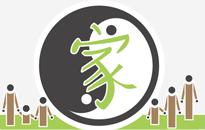Family doctors for parents & children
HOLISTIC
FAMILY
MEDICINE
Chinese Medicine
The far eastern art of healing from China with a tradition of thousands of years has become more and more popular in the western world and also more recognized scientifically. Where conventional medicine has exhausted its possibilities, Chinese medicine could offer a complementary treatment of a different kind and in a different direction. In China, the integration of Chinese and western medicine is a goal to be striven at. For our practice, it is a daily reality. This combination of east and west has proven to be very valuable for many chronic diseases of adults as well as of children.
The Chinese doctor looks at the human person as consisting of 5 hollow organs (Zhang) for reception and trsansport and 6 solid organs (Fu) for storage, which all interact with each other, being parts of a united whole (the Microcosmos). This in turn is part of a much bigger whole (the Macrcosmos) – Nature, the universe, in which the human being lives and belongs to. According to the views of Chinese medicine, Man and Nature are very closely connected. When we practise Qigong, e.g. we take in Qi (energy) from the universe to maintain our health. On the other hand, wind and coldness are phenomena of Nature which can make people ill. Also regarding nutrition, the seasons of Nature are taken into consideration.
In Nature, the polarities such as day and night, summer and winter are connected in a unity. The opposite poles Yin and Yang develop and transform into each other continuously. In men, Yin and Yang organs and meridians are connected in the wholeness of the body. Health is the optimal state of balance of Yin and Yang. Illness results from the deviation away from balance.
The diagnosis is based on the history, the examination of the tongue and pulse. The analysis reveals the causal factors of the illness, what kind of imbalance there is and in which organ or functional system the disturbances are found. The treatment is aimed at expelling external causal agents of illness which have invaded into the body, to alleviate blockages of Qi and Xue (blood), to remove disturbances and finally to reinstate the balance in the organism. In this sense, Chinese medicine is a holistic, regulatory process to self healing.
 Of the “5 pillars” of traditional Chinese medicine (herbal teas, acupuncture and moxibustion, Tuina massage, dietetics and Qigong), acupuncture is the most well known in the western world. In China, the prescription of herbal teas is the most important and most frequently applied treatment for acute and chronic illnesses. Nutrition therapy and Qigong require the active participation of the patient in organising a healthy lifestyle. This personal care of life and health is prevention of illness according to Chinese medicine.
Of the “5 pillars” of traditional Chinese medicine (herbal teas, acupuncture and moxibustion, Tuina massage, dietetics and Qigong), acupuncture is the most well known in the western world. In China, the prescription of herbal teas is the most important and most frequently applied treatment for acute and chronic illnesses. Nutrition therapy and Qigong require the active participation of the patient in organising a healthy lifestyle. This personal care of life and health is prevention of illness according to Chinese medicine.


